Emerging Voices
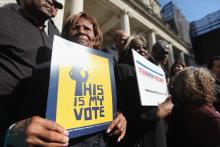
The 15th Amendment to the United States Constitution was the third in a triad of amendments crafted to protect the rights of recently emancipated African Americans. The 13th Amendment abolished slavery. The 14th Amendment granted citizenship to people who were once enslaved, regardless of race. The 15th Amendment, which was passed by Congress February 26, 1869 and ratified February 3, 1870, reads:
Section 1.
The right of citizens of the United States to vote shall not be denied or abridged by the United States or by any State on account of race, color, or previous condition of servitude —
Section 2.
The Congress shall have the power to enforce this article by appropriate legislation.
It took nearly a century of blood, terror, and tears, but in 1965 President Lyndon B Johnson and the 89th U.S. Congress passed the Voting Rights Act of 1965; legislation to enforce the 15th Amendment. Finally.
One year more than a decade later, in 1976, I walked hand-in-hand with my mother trudging up and down city blocks lined with row houses in our West Oak Lane neighborhood of Philadelphia. Each time we knocked and a neighbor came to the door, my mom, who served as the judge of elections for our neighborhood, asked: “Are you registered to vote?” If they weren’t, out came the clipboard.
I didn’t understand the legacy we were a part of that day, but with each sweep of the clipboard we were brandishing a non-violent weapon in the long fight of our ancestors to be and stay free. For 100 years — that’s five generations — they faced down the terror of burning crosses, threats to life and livelihood, and the elaborate labyrinth of Jim Crow voting laws — all set up to suppress their votes, all set up to crush their ability to exercise dominion.
So, when the Supreme Court announced recently that one of the cases it would take up in this session was a challenge to Section 5 of the Voting Rights Act, the hairs rose on the back of my neck.
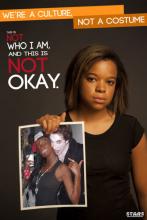
Americans love Halloween. In fact, maybe it’s fair to say we go crazy about Halloween. How crazy?
Americans spend $310 million dollars per year on costumes … for our pets. Wow.
In total, Americans spend between $6.5 – $6.86 billion dollars on all things Halloween: costumes, candy, and decoration. More wowzers.
So, as the average consumers spends about $27 on costumes, I thought it’s never too early to encourage folks to be careful how they dress up for Halloween … even if it’s “all in the spirit of fun.”
Listen, I like fun. And while my social life is nearly zilch, I like fun parties, but it’s all fun and games until someone shows up at a costume party or … err … at your front door trick-or-treating in a borderline racist costume.
Yes, it’s not too early to tell people:
Please don’t dress up in a blackface, yellowface, brownface, or any other costumers that stereotype, denigrate, or mock another culture.
Don’t caricature another real culture. Why? Because we’re a culture and not a costume.
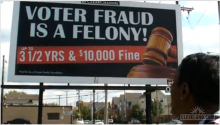
Fraud is a strong word. Webster's defines fraud as deceit and trickery, and an "intentional perversion of truth in order to induce another person to part with something of value or to surrender a legal right." Fraud is a serious matter.
The word "fraud" is on billboards around Ohio. I started noticing this a few weeks ago, when I was driving through a working class African American community in Cleveland and noticed a billboard that read: "Voter Fraud is a Felony: 3 1/2 years & $10,000 fine."
The red-and-black sign is accented by a large gavel in the lower right hand corner. A few days later, I noticed a similar billboard in Dayton, and late last week saw two such billboards near my home in urban Cincinnati. In an election season that has seen more jockeying around voter fraud and voter suppression than any in my memory, these billboards caught my eye.
Voter fraud sure sounds horrible, and based on these billboards in Ohio, one would imagine that it is an epidemic. After all, one of the hallmarks of American democracy is our fair and free elections.
But the billboards quickly created dissonance for me based on a recent meeting I and other pastors from Ohio Prophetic Voices enjoyed with Ohio Secretary of State John Husted. During the meeting, Husted told us that voter fraud is extremely rare and almost nonexistent. Statistics back up Husted's contention.
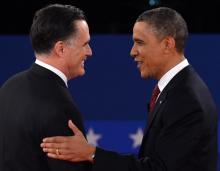
The presidential election is only weeks away… and it’s getting ugly out there. I mean … really ugly.
And before you think I’m just talking about the political process, the political parties, or the respective candidates, I was actually talking about you, me, us, and them … the people. And by people, I’m also especially talking about Christians.
Sometimes, I feel it would be appropriate to label how some Christians engage the presidential election season as “Christians Gone Wild."
Since there’s sure to be drama this week and next following the debates — and each day leading up to Election Day on Nov. 6, and likely some weeks afterward — I thought I’d share with you my 10 Commandments of the Election Season for Christians in hopes that it might speak some balance, sense, and perspective to any readers, not just during this election season but thereafter; not just in this country but in any country.
Why else am I sharing this?
Because I really want you to still respect yourself the morning after the election season.
Because I really want your friends to still respect you, too.
Know what I mean?
So, here are my 10 Commandments of the Election Season

Jazz is an embodiment of creative tension; it is essentially a medium that is expressed through creativity and change. It’s also a wonderful metaphor for what my life often feels like. There is beauty that often emerges from the tensions of life’s unpredictable rhythms. I have never resonated so deeply with this idea than in the last five years since I became a parent.
When I was pregnant with my son Javier, I read stacks and stacks of books on parenting: nurturing your child, building your child’s faith, raising a baby in the city, saving for college, and organic cooking — you name it, I read it. I conducted informal focus groups with all of my parent friends. I was prepared (I think you already know where this is going…). I was so proud of myself, I gave birth to this beautiful boy and I even graduated with (informal) honors from the nursing class at the hospital. So there I am, confidently pushing my newborn in his new stroller out of the Lenox Hill hospital, when I see the nurse smiling at me. I naturally think she is just as smitten with this beautiful baby boy of mine. But then she stops me and with a tone superiority tells me that my baby is backwards in the stroller: “you need to turn him around.” And it was at that moment that I realized I had no idea of what I was doing and that this creative process of raising a child was going to also going to involve a lot of not knowing, unlearning, and a surrendering of what I could not control or anticipate.

I was groomed in a Latino home where nail salons were viewed as rites of passage for becoming a senorita — growing young lady. Sometimes when I’m looking for some TLC, I head to my local nail salon in East Harlem. I could go to a more upscale salon, but here at Pretty Nail Salon, is where I want to be — connected to a neighborhood of ladies who have utilized storefront nail salons, beauty parlors, and hair-braiding places as makeshift therapeutic spaces where counsel and support is just as paramount to looking beautiful.
I have also discovered that nail salons are burgeoning places of policy concerns. Pretty Nail Salon has provided me with an informal education on how social policy affects the everyday day lives of working class folks. Our presidential candidates could also benefit from an appointment at Pretty Nail Salon, to listen to the local narratives and deepen their understanding of how social policy is affecting the lives of the urban poor and working class.
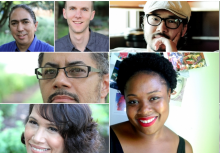
Today, Sojourners is launching a new project called Emerging Voices, and it’s one of the most exciting things I have been involved with for a long time. It aims to mentor, develop, and promote the most dynamic up-and-coming communicators — speakers, preachers, and teachers — who so clearly are called to lead and publicly articulate the biblical call to social justice.
The vision for this project is exciting and something to be celebrated. It also calls to mind a critical observation: Our world often wants saviors, not prophets; new messiahs, not leaders.
We want heroes with superhuman strength who save the day, not mere mortals who speak the truths we typically don’t want to hear. Even the modern day giants of social justice — Dr. Martin Luther King Jr., Dorothy Day, and Mahatma Gandhi, for example —were at best prophets, but never saviors.
It’s easy to slip into the mentality that one person, one voice will rise up in a generation, and that he or she will change the world as we know it. Perhaps we even think, “Maybe I will change the world.”
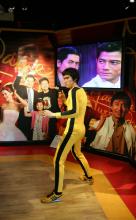
My sons, ages 13 and 10, spend two evenings each week on a golf course because I parent out of my own personal brokenness, which includes an acute awareness of life experiences and skills I was not exposed to growing up.
Tennis lessons. Skiing lessons. Swimming lessons. Golf lessons.
Check. Check. Check. Check.
(My daughter got the first three. She escaped golf because she has immersed herself into the world of dance for the past few years though it’s not completely out of the picture yet.)
One of my goals has been to expose my children to things I didn’t do and at one point or another felt like I had missed out on. This all despite the fact that I also wrestle with my own personal prejudices against sports like tennis and golf because they have in one way or another represented privilege and access to opportunities and networks my parents and I did not have.
So it did not surprise me to see a very diverse group of participants on our first day at the course – diverse meaning White or Caucasian children were in the minority. Golf, whether you are in business or in medicine, more if you are male but increasingly so if you are female, is one of those “life skills” that also translates into opportunities and networks that non-White communities continue to learn about and enter into.

On Aug. 17, three members of the Russian feminist punk band/performance art group Pussy Riot received the verdict in the criminal case against them: Guilty of "hooliganism" motivated by "religious hatred." Each was sentenced to two years in prison.
As a faith-based community organizer, I spend a great majority of my time trying to get political issues into the church so that the gospel can be relevant to the reality of those on and off the pews.
Therefore, I believe the best place for a “pussy riot” is the church. Although this may seem sacrilegious, here's why:
1. When the church ignores social and political issues it silently blesses injustice. (See slavery, the Holocaust, lynching, and child sexual abuse.) Testimony Time is a set time in many Black Churches when congregants can speak of their pains and triumphs and how God brought them through.
Testimony time is democratic and a time of raw honesty. I call what Pussy Riot did protestifying because they protested by testifying about the political conditions of their country.
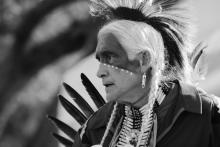
In December, I will be hosting a public reading of the 2010 Department of Defense Appropriations Act in front of the Capitol in Washington, D.C.
I am doing so because page 45 of this 67 page document contains a generic, non-binding apology to native peoples on behalf of the citizens of the United States.
The text of the apology included in the defense appropriations bill reads:
Apology to Native Peoples of the United States
Sec. 8113. (a) Acknowledgment and Apology- The United States, acting through Congress —
(1) recognizes the special legal and political relationship Indian tribes have with the United States and the solemn covenant with the land we share;
(2) commends and honors Native Peoples for the thousands of years that they have stewarded and protected this land;
(3) recognizes that there have been years of official depredations, ill-conceived policies, and the breaking of covenants by the Federal Government regarding Indian tribes;
(4) apologizes on behalf of the people of the United States to all Native Peoples for the many instances of violence, maltreatment, and neglect inflicted on Native Peoples by citizens of the United States;
(5) expresses its regret for the ramifications of former wrongs and its commitment to build on the positive relationships of the past and present to move toward a brighter future where all the people of this land live reconciled as brothers and sisters, and harmoniously steward and protect this land together;
(6) urges the President to acknowledge the wrongs of the United States against Indian tribes in the history of the United States in order to bring healing to this land; and
(7) commends the State governments that have begun reconciliation efforts with recognized Indian tribes located in their boundaries and encourages all State governments similarly to work toward reconciling relationships with Indian tribes within their boundaries.
This apology was not publicized by the White House or Congress. As a result, a majority of the 350 million citizens of the United States do not know they have been apologized for, and most of the 5 million Indigenous Peoples of this land do not know they have been apologized to.

Does anybody else feel this weight?
I woke up this morning in tears. I don’t know why today is different, but I do know the weight is for my brothers and sisters who are in pain.
I imagined what the night was like for folks in my neighborhood who had to fend off threats last night.
I imagine the young girl in a car — against her will or against her first choice — with the guy named John, and I lament for her soul.
I imagine the young guy standing out all night selling death so he can have a little life — whether it’s in the form of food, dignity or just to feel like he is meeting some need, somehow.
I imagine the mom lying in the bed next to someone she would rather not touch, but because he pays the bills for her kids to eat and sleep, she puts up with his abuse and doesn’t say anything about the other woman he also lies with around the corner.

With approval ratings a good 15 points higher than her husband, there are probably some strategists wishing they could run the Michelle Obama re-election campaign right now. While the White House legal counsel looks into the constitutionality of a husband/wife switch, the campaign is trying to put her popularity to work.
Last week, the First Lady spoke to the quadrennial General Conference of the African American Methodist Episcopal Church. While the speech was a get-out-the-vote plug, it also shed an interesting light on both her personal faith and the theological tradition of the nation’s oldest independent, predominantly African-American congregations.
In reading the First Lady’s speech, I was intrigued to see a strong emphasis on some concepts I often associate with “missional” churches.
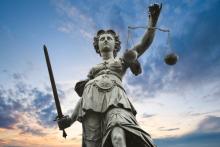
On Thursday, the Supreme Court ruled that the federal government does hold the constitutional power to mandate that most American's purchase health insurance or pay a penalty. This power is maintained in Congress’s ability to levy taxes.
The justices also ruled that the federal government does hold the constitutional power to expand Medicaid, making more people eligible to receive the benefit, but, like the original Medicaid law of 1965, states can opt out of the expansion if they so choose.
What does this mean? And what does this mean for Jesus followers?
I made myself read the Grand Jury report about Sandusky's alleged crimes and it was 23 pages of vile and inhuman behavior not only by the predator but by those who actually saw it, heard of it, or received reports about it across their desk.
Then to also learn that all these children were black deepens my sadness.
I am forced to ask some really hard questions.
Are black people that expendable?
Was the fact that they were black, poor and powerless the reason it was overlooked?
Is football, a school, and personal reputation so important that a 10-year-old black boy being raped in a bathroom can be covered up?
I had an idea that power was corrupt, but this is much more than simply corrupt. It is pure evil.
In one of my last blog posts on God's Politics, I had some pretty strong opinions on the negative comments made by Bernard Hopkins about Donovan McNabb implying that McN
I attended a majority white high school in the late '70s and since that time my life has been one cross-cultural bowl of spaghetti. It tastes good but is really messy, sometimes sauce all over your shirt.